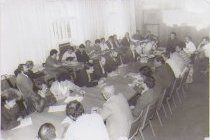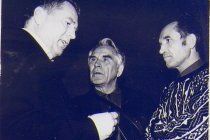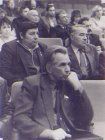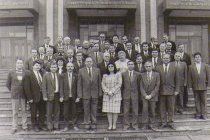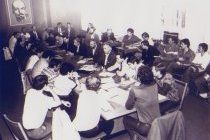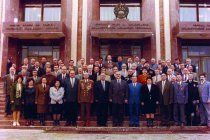 Русский
Русский English
English-







Stages of formation of the Pridnestrovian parliament
The Supreme Council of Pridnestrovie this year marks the anniversary date - 30 years. History, facts and comments", the main stages of the formation and development of the legislature of our republic are outlined in the material of the parliamentary press service under the heading "The Supreme Council.
Inhabitants of Pridnestrovie decided to create a new state at the turn of the 80s-90s of the last century, unwilling to follow the nationalist path of Chisinau. This means that all the authorities were also needed.
On September 2, 1990, at the II Congress of Deputies of all levels, the PMSSR was proclaimed, the deputies of the Provisional Supreme Council were elected. The first elections of parliamentary deputies in the history of Pridnestrovie took place already in November. The first meeting was held on November 29. It was this date that went down in history as the day of the formation of the parliament of our state.
The PMR Supreme Council of the first two convocations by analogy with the Soviet Union was bicameral.
The Council of the Republic and the Council of Nationalities continuation in office was from 1990 to 1995. Deputies of the Council of Nationalities had the right to block the adoption of any law-in-draft if, in their opinion, it violated the rights of citizens of any nationality. The Chamber of Legislators and the Chamber of Representatives worked in the structure of the PMR Supreme Council in the second convocation from 1995 to 2000. The House of Legislators was engaged in the adoption of laws, and the competence of the House of Representatives included consideration of the adopted laws, followed by their approval or rejection. It also introduced territorial committees, which accelerated the work and provided feedback with voters. Parliamentary hearings were held with the involvement of specialists.
The Pridnestrovian Parliament became unicameral since the third convocation (2000-2005). Before that, a candidate had to be 21 years old to become a deputy. The deputies of the Supreme Council of the third convocation have raised the age limit to 25 years.
The formation of the foundations of the statehood of Pridnestrovie was laid by the deputies of the Supreme Council of the first convocation. The forms of Government reflected in the constitution of the republic were modified from Soviet to parliamentary, parliamentary-presidential and presidential. Changes took place during the work of the deputies of the first three convocations. An important factor in the legislative process was the law on amendments and additions to the Constitution for the deputies of the third convocation. It entered into force on the 22nd of July, 2000. In accordance with the changes, other laws of the state had to be brought into line with the constitution within two years. In addition, after two years, the laws and other legal acts of the USSR and the Moldavian SSR lost force and were not subject to application on the territory of the PMR. This meant that it was necessary to develop and adopt the relevant Pridnestrovian laws in order to prevent a legislative vacuum. The parliamentarians coped with this difficult task.
In the elections to the parliament of the fourth convocation (2005–2010), there was a qualitative breakthrough in the information blockade. Despite the OSCE demarche, approximately 150 independent observers from non-governmental organizations, a number of parties from Russia, Ukraine, Moldova, Belarus, Romania, Bulgaria, Poland, Ireland, Great Britain, Israel, Jordan, Palestine worked in Pridnestrovie.
In June 2006, deputies elected the first Human Rights Commissioner in the history of the republic in the course of the plenary session of the Supreme Council of the fourth convocation. It was Vasily Kalko. The parliamentary faction "Obnovlenie" that included 22 deputies was created at the same time.
During the work of the Supreme Council of the fifth convocation (2010–2015), the Youth Parliament appeared. The first meeting took place in May 2011. 11 girls and 31 young men received the right to be the first to represent the advisory body of power, which forms a personnel reserve and guarantees deputy succession.
The parliamentarians of the sixth convocation (2015–2020) began their work in difficult time, when the republic was on the verge of economic collapse. The Supreme Council had to rectify the situation with the help of legislation. Since 2016, the work of public authorities and administration is planned according to the principle of program-target orientation. In the law on the republican budget of this time, state programs are formed, targeted funds are financed.
The Supreme Council decided to reduce the number of parliament members and voted in favor of these changes. The seventh convocation of the Pridnestrovian parliament will consist of 33 deputies (up to now there were 43). Now each Deputy of the Supreme Council will represent the interests of 12-15 thousand voters, the same as in the early years of the republic.
Budgetary Fund for the execution of orders of voters was created for the first time in the work of the sixth convocation of parliament. Since 2018, each deputy of the Supreme Council has been allocated money to solve housing and public utilities issues and improve the district.
The sixth convocation of the PMR Supreme Council can be called the most consolidated with other authorities. There are disputes, but a single team is working to improve the welfare of Pridnestrovie.
The Supreme Council has held dozens of official meetings with representatives of the Russian Federation, European states and the United States, as well as various international structures - the EU, OSCE, Council of Europe and the UN during international cooperation.
Cooperation of the Supreme Council with the Federal Assembly of the Russian Federation occupies a special place in inter-parliamentary interaction. A constant dialogue with the State Duma and the Federation Council is being conducted both at the level of the leadership and at the level of specialized committees, which undoubtedly contributes to the strengthening of our interstate relations.
Support and development of parliamentary cooperation with colleagues from our fraternal republics of Abkhazia, Artsakh and South Ossetia was continued within the framework of the Interparliamentary Assembly of the Community “For Democracy and the Rights of Peoples”.
Pridnestrovian parliamentarians have repeatedly taken part in many conferences in the CIS countries and far abroad.
Deputies of the Supreme Council of Pridnestrovie of all convocations have gone a difficult path from laying the foundations of statehood to its development and improvement.


